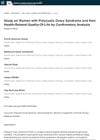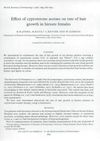39 citations,
January 1980 in “Dermatology” Cyproterone acetate was effective in treating acne, hirsutism, and alopecia with few side effects.
33 citations,
January 1979 in “Acta obstetricia et gynecologica Scandinavica” Diane® is an effective contraceptive that also helps treat acne and mild hair growth issues.
 19 citations,
January 1997 in “Dermatologic Clinics”
19 citations,
January 1997 in “Dermatologic Clinics” Most treatments for hair loss in 1997 were not effective for most people, and maintaining hair growth was difficult.
7 citations,
May 2014 in “Iranian Red Crescent medical journal” Laser hair removal is effective for hirsutism when combined with treatment for the underlying causes.
 3 citations,
July 2011 in “Expert Review of Dermatology”
3 citations,
July 2011 in “Expert Review of Dermatology” Effective treatments for excessive hair growth in women include creams, laser therapy, and medications, with the choice depending on individual needs and potential side effects.
 3 citations,
January 1985 in “PubMed”
3 citations,
January 1985 in “PubMed” Hormonal birth control can cause skin issues, but low-dose options and those with antiandrogens may reduce these effects.
 1 citations,
November 2011 in “Open access journal of contraception”
1 citations,
November 2011 in “Open access journal of contraception” Birth control pills with low-dose estrogen and antiandrogenic progestins can effectively treat acne.

Women with PCOS often face menstrual issues, weight gain, and stress, affecting their quality of life.
April 2018 in “International journal of innovative research in medical science” Neem and Zanjabeel are as effective as standard drugs for treating hirsutism in PCOD patients.
 1 citations,
November 2019 in “Archives of breast cancer”
1 citations,
November 2019 in “Archives of breast cancer” Some hormone treatments might raise breast cancer risk, while others don't seem to.
 43 citations,
July 1984 in “Clinical and Experimental Dermatology”
43 citations,
July 1984 in “Clinical and Experimental Dermatology” Antiandrogen therapy helped increase hair growth in women with hormonal imbalances related to baldness.
30 citations,
February 2016 in “British journal of dermatology/British journal of dermatology, Supplement” Some medications can reduce excessive hair growth in women, but more research is needed to find the best treatment combinations.
 4 citations,
July 2017 in “Medicine”
4 citations,
July 2017 in “Medicine” The document concludes that managing PCOS involves lifestyle changes, medication for symptoms, and weight loss for fertility improvement.
4 citations,
January 1991 in “Journal of obstetrics and gynaecology” The photographic method accurately measures hair growth and both treatments effectively reduced hair growth in hirsute women.
 117 citations,
May 2017 in “Human Reproduction Update”
117 citations,
May 2017 in “Human Reproduction Update” The update highlights that non-classic congenital adrenal hyperplasia is common in women with excess male hormones, requires specific hormone tests for diagnosis, and has various treatment options depending on age and symptoms.
 36 citations,
May 2017 in “The journal of sexual medicine”
36 citations,
May 2017 in “The journal of sexual medicine” Cyproterone acetate treatment is safe and causes mild feminization, which increases with added estrogen.
 26 citations,
December 1981 in “British journal of dermatology/British journal of dermatology, Supplement”
26 citations,
December 1981 in “British journal of dermatology/British journal of dermatology, Supplement” Cyproterone acetate reduced hair growth in most hirsute females and made hair softer, thinner, and lighter.
42 citations,
May 2009 in “Contraception” The oral contraceptive with ethinyl estradiol and chlormadinone acetate is effective in treating moderate acne.
 January 2008 in “The European Journal of Contraception & Reproductive Health Care”
January 2008 in “The European Journal of Contraception & Reproductive Health Care” Non-daily contraceptives cause fewer side effects and are more satisfying to women, and certain oral contraceptives can treat acne and seborrhoea, with a combination of chlormadinone acetate and ethinyl estradiol being highly effective and safe.

Cyproterone acetate with ethynyl estradiol significantly improved acne and seborrhea in women, but was less effective for hair loss and excessive hair growth.
 15 citations,
February 2019 in “Internal Medicine Journal”
15 citations,
February 2019 in “Internal Medicine Journal” Australian doctors experienced in adult transgender healthcare mostly prescribe intramuscular testosterone and oral estradiol, recommend mental health assessments before hormone therapy, and support improved training and guidelines.
 108 citations,
March 2006 in “Archives of Dermatology”
108 citations,
March 2006 in “Archives of Dermatology” Finasteride with oral contraceptive helps improve hair loss in premenopausal women.
 30 citations,
April 2007 in “Dermatologic Clinics”
30 citations,
April 2007 in “Dermatologic Clinics” The document concludes that new treatments are needed to better manage acne and reduce side effects related to current therapies.
 30 citations,
December 2001 in “Journal of The European Academy of Dermatology and Venereology”
30 citations,
December 2001 in “Journal of The European Academy of Dermatology and Venereology” Hormonal therapy is a good option for women with severe acne, especially when there's a chance of hormone imbalance.
 10 citations,
November 2010 in “Journal of Pharmacy Practice”
10 citations,
November 2010 in “Journal of Pharmacy Practice” The document says PCOS is a common hormonal disorder in women, diagnosed by certain criteria, and managed with lifestyle changes and various medications.
 204 citations,
May 2014 in “The Journal of Sexual Medicine”
204 citations,
May 2014 in “The Journal of Sexual Medicine” Hormone therapy for trans individuals is effective and generally safe in the short term.
 1 citations,
February 2017 in “Journal of gynecology and womens health”
1 citations,
February 2017 in “Journal of gynecology and womens health” The document concluded that more research is needed to understand how estrogen affects the enzyme involved in hirsutism development.
The document helps doctors recognize and treat excessive hair growth in women.
 16 citations,
August 2014 in “International Journal of Women's Health”
16 citations,
August 2014 in “International Journal of Women's Health” The estradiol valerate/dienogest oral contraceptive helps with heavy periods, may improve acne and symptoms in PCOS, and doesn't affect sexual function.
 56 citations,
April 2003 in “Fertility and Sterility”
56 citations,
April 2003 in “Fertility and Sterility” All three treatments reduce hirsutism, but spironolactone works best long-term.





















